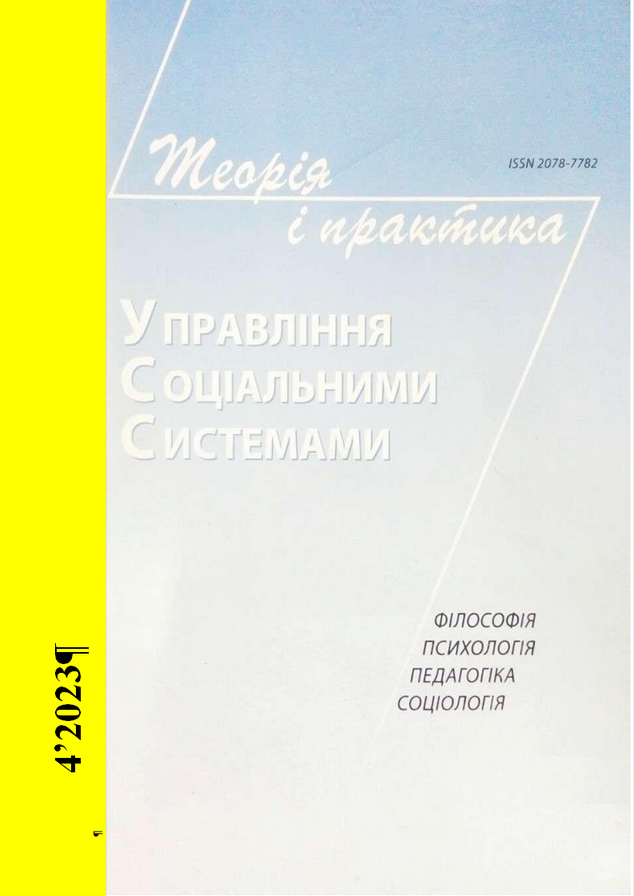РЕСУРСИ АДАПТАЦІЇ ДО НАВЧАННЯ СТУДЕНТІВ ─ МАЙБУТНІХ БАКАЛАВРІВ МАШИНОБУДІВНИХ СПЕЦІАЛЬНОСТЕЙ ЗА СУЧАСНИХ ОСВІТНІХ УМОВ
DOI:
https://doi.org/10.20998/2078-7782.2023.4.04Ключові слова:
самоосвітня діяльність, психологічне благополуччя, майбутні бакалаври машинобудівних спеціальностей, внутрішній ресурс студентів, освітні умовиАнотація
Анотація: в статті розглянуто вплив воєнного стану на самоосвітню діяльність студентів ─ майбутніх бакалаврів машинобудівних спеціальностей у закладах вищої освіти. Обґрунтовано необхідність підвищення внутрішнього ресурсу у здобувачів освіти для їхньої ефективної адаптації до кризових непередбачуваних змін в освітньому середовищі та пов`язаних з цим стрес-факторів. Підтверджено аргументи щодо визначення психологічного благополуччя студентів способом дієвого керування стресами та результативного навчання в умовах стрес-ситуацій і невизначеності. В статті наведено результати педагогічного експерименту з метою визначення зв’язку між психологічним благополуччям майбутніх бакалаврів машинобудівних спеціальностей та їхньою самоосвітньою діяльністю в освітніх умовах сьогодення. Підкреслено значущість самостійної пізнавальної діяльності студентів-машинобудівників, що полягає в здатності протистояти викликам і в освітньому середовищі, і в позааудиторному житті студентів, що позитивно впливає на рівень їх психологічного благополуччя.
Посилання
Bychko, M. (2022), “Self-education of future doctors and its provision under martial law”, Modern concepts of teaching natural sciences in medical educational institutions: Proceedings of the XV International Scientific and Methodological Internet Conference, Kharkiv: KHNMU, pp. 67 – 68
Kostruba, N., Polishchuk, Z. (2022), “Psychological well-being of students during the war: an empirical analysis”, Psychological perspectives, is. 40, pp. 51 – 61
Kravtsova, N., Konkin, V. (2022), “Self-educational activity of future bachelors of mechanical engineering as one of the main factors of successful learning in modern extreme educational conditions”, Information technologies: science, engineering, technology, education, health: abstracts of the 30th International scientific and practical conference MicroCAD-2022, Kharkiv: NTU “KHPI”, p. 757
Lucianinova, O. (2022), “Challen-ges in Education: Vectors of Self-Realisation of Future Engineers-Pedagogues in Vocational Education and Professional Adaptation of a HEI Teacher”, Career guidance: state and prospects of development: Proceedings of the XII All-Ukrainian Psychological and Pedagogical Readings dedicated to the memory of Doctor of Pedagogical Sciences, Professor Fedorishin B, edited by Pavlik N, Kyiv: I. Ziayun Institute of Pedagogical and Adult Education of the National Academy of Pedagogical Sciences of Ukraine, pp. 47 – 50
Mazai, L., Shtyfurak, V. (2022), “Narrative Techniques in the Psychocorrection of Resource Support for the Professional Development of Future Psychologists”, Scientific works of the Interregional Academy of Personnel Management. Psychology, no. 1(54), pp. 47 – 54
Mikhailichenko, V., Gura, T., Galushchak, I. (2020), “Professional and Personal Self-Development of Future Engineers in the Learning Process: Essence and Mechanisms”, Psychological journal, vol. 6, is. 4(36), pp. 257 – 266
Panok, I. (2022), “Value and sense self-regulation as a factor of student's life self-determination”, Dissertation Kharkiv National Pedagogical University
Pidluzhna, S., Korchan, N., Fedorchenko I., Litovka V. (2022), “Features and role of HEI self-education in distance learning”, Methods of teaching natural sciences in secondary and higher education (XXIX Karishynski readings): Proceedings of the International Scientific and Practical Conference on the Development of Models for Preparing Future Teachers for Pedagogical Activity in the New Ukrainian School, under the editorship professor Grineva M, Poltava: Astray, pp. 174 – 177
Romanovskyi, O., Horbach, I. (2021), “Emotional and Volitional Component as a Component of the Leadership Potential of Future Specialists of the State Penitentiary Service of Ukraine”, The scientific school of Academician Ivan Ziaziun in the works of his associates and students: Proceedings of the VIII Scientific and Practical Conference on 25-26 May 2021, under the editorship Romanovskyi O., Kharkiv: NTU “KHPI”, pp. 160 – 163
Saveliuk, N. (2022), “Psycholo-gical well-being of student youth: a comparative analysis in covid and military contexts”, Psychological perspectives, is. 39, pp. 322 – 340
Tarasenko, M. (2022), “Improving students' independent work under martial law”, Educational Process in the Conditions of Martial Law in Ukraine: Proceedings of the All-Ukrainian Scientific and Pedagogical Advanced Training, Odesa: Helvetica Publishing House, pp. 422–424
Kharytynsky, A. (2022), “The psychological content of the concept of subjective well-being”, Organisational psychology. Economic psychology, no. 3(27), pp. 149 – 159
Yakymchuk, B (2022), “Develop-ment of stress resistance of the object of study in the educational environment in the context of its self-realisation”, Bulletin of the National Defence University of Ukraine, no.66(2), pp. 139 – 145
Diener, E. (2000), “Subjective well-being: The science of happiness and a proposal for a national index”, American Psychologist, no. 55, pp. 34 – 43
Engin, D. (2006), “The relation-ships among coping with stress, life satisfaction, decision-making styles and decision self-esteem: An investigation with Turkish university students”, Social Behavior and Personality, no. 34, pp. 1161 – 1170
Ryff, C. (1989), “Happiness is everything, or is it?: Explorations of the meaning of psychological well-being”, Journal of Personality and Social Psychology, no. 57, pp. 1069 – 1081
Sheldon, K. (2002), “The self-concordance model of healthy goal striving: When personal goals correctly represent the person”, Handbook of self-determination research, pp. 65 – 86.
Waterman, A. (2008), “Reconsi-dering happiness: A eudaimonist’s perspec-tive”, Journal of Positive Psychology, no 3, pp. 234–252
##submission.downloads##
Опубліковано
Номер
Розділ
Ліцензія
Авторське право (c) 2023 Наталія Кравцова

Ця робота ліцензується відповідно до Creative Commons Attribution-NonCommercial-NoDerivatives 4.0 International License.
Автори, які публікуються у цьому журналі, погоджуються з наступними умовами:- Автори залишають за собою право на авторство своєї роботи та передають журналу право першої публікації цієї роботи на умовах ліцензії Creative Commons Attribution License, котра дозволяє іншим особам вільно розповсюджувати опубліковану роботу з обов'язковим посиланням на авторів оригінальної роботи та першу публікацію роботи у цьому журналі.Автори, які публікуються у цьому журналі, погоджуються з наступними умовами:

